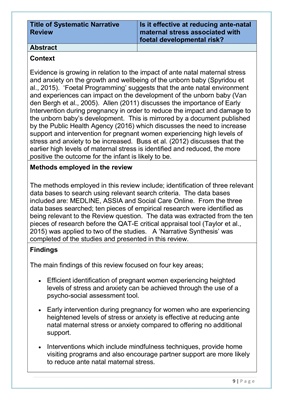
9 | P a g e
Title of Systematic Narrative
Review
Is it effective at reducing ante-natal
maternal stress associated with
foetal developmental risk?
Abstract
Context
Evidence is growing in relation to the impact of ante natal maternal stress
and anxiety on the growth and wellbeing of the unborn baby (Spyridou et
al., 2015). 'Foetal Programming' suggests that the ante natal environment
and experiences can impact on the development of the unborn baby (Van
den Bergh et al., 2005). Allen (2011) discusses the importance of Early
Intervention during pregnancy in order to reduce the impact and damage to
the unborn baby's development. This is mirrored by a document published
by the Public Health Agency (2016) which discusses the need to increase
support and intervention for pregnant women experiencing high levels of
stress and anxiety to be increased. Buss et al. (2012) discusses that the
earlier high levels of maternal stress is identified and reduced, the more
positive the outcome for the infant is likely to be.
Methods employed in the review
The methods employed in this review include; identification of three relevant
data bases to search using relevant search criteria. The data bases
included are: MEDLINE, ASSIA and Social Care Online. From the three
data bases searched; ten pieces of empirical research were identified as
being relevant to the Review question. The data was extracted from the ten
pieces of research before the QAT-E critical appraisal tool (Taylor et al.,
2015) was applied to two of the studies. A 'Narrative Synthesis' was
completed of the studies and presented in this review.
Findings
The main findings of this review focused on four key areas;
Efficient identification of pregnant women experiencing heighted
levels of stress and anxiety can be achieved through the use of a
psycho-social assessment tool.
Early intervention during pregnancy for women who are experiencing
heightened levels of stress or anxiety is effective at reducing ante
natal maternal stress or anxiety compared to offering no additional
support.
Interventions which include mindfulness techniques, provide home
visiting programs and also encourage partner support are more likely
to reduce ante natal maternal stress.